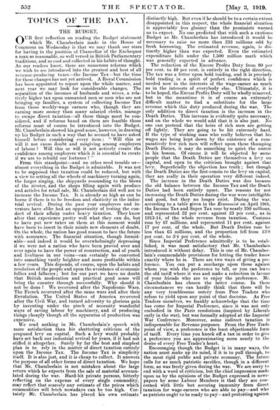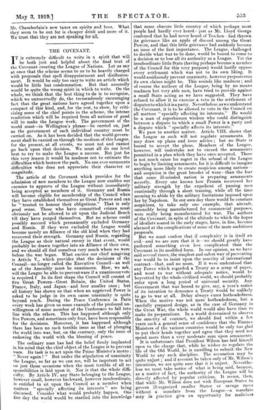TOPICS OF THE DAY.
THE BUDGET.
OUR first reflection on reading the Budget statement which Mr. Chamberlain made in the House of Commons on Wednesday is that we may thank our stars for having in the position of Chancellor of the Exchequer a man so reasonable, so well versed in British Parliamentary traditions, and so cool and collected in his habits of thought. As our readers know, there are numerous reforms which we wish to sec introduced into the greatest and best of all revenue-producing taxes—the Income Tax—but the time for these changes has not yet arrived. A Royal Commission has been appointed to report upon the whole matter, and next year we may look for considerable changes. The separation of the incomes of husbands and wives, a rela- tively higher tax upon unmarried men or men who are not bringing up families, a system of collecting Income Tax from those weekly-wage earners who, though they are earning more money than many salaried clerks, manage to escape direct taxation—all these things must be con- sidered, and if reforms based on them are feasible those reforms must of course be introduced into the Budget. Mr. Chamberlain showed his good sense, however, in drawing up his Budget in such a way that he seemed to have asked
himself before considering every item : Will this or will it not cause doubt and misgiving among employers of labour ? Will this or will it not actively create the confidence among employers which it is essential to create if we are to rebuild our fortunes ? "
From this standpoint—and no other need trouble us— almost everything in the Budget is admirable. It was not to be supposed that taxation could be reduced, but with a view to setting all the wheels of machinery turning again, the forges ringing, the shipyards resounding to the blows of the riveter, find the shops filling again with produce and articles for retail sale, Mr. Chamberlain did well not to increase the Income Tax. It is already as high as can be borne if there is to be freedom and elasticity in the indus- trial revival. During the past year employers and in- vestors have alike had an opportunity of testing the con- duct of their affairs under heavy taxation. They know after that experience pretty well what they can do, but to have put new taxes on them at this moment would have been to insert in their minds new elements of doubt. On the whole, the nation has good reason to face the future with assurance. The financial situation, though formid- able—and indeed it would be overwhelmingly depressing if we were not a nation who have been proved over and over again to have the power of resurrection, and of youth and liveliness in our veins—can certainly be converted into something vastly brighter and more profitable within a few years. This depends, of course, upon the habits and resolution of the people and upon the avoidance of economic follies and fallacies ; but for our part we have no doubt that British moderation and practical good sense will bring the country through successfully. Why should it not be done ? We recovered after the Napoleonic Ware. The French recovered after the same wars and after their Revolution. The United States of America recovered after the Civil War, and turned adversity to glorious gain by inventing under the pinch of necessity wonderful ways of saving labour by machinery, and of producing things cheaply though all the apparatus of production was expensive.
We read nothing in Mr. Chamberlain's speech with
more satisfaction than his shattering criticism of the proposed levy on capital. Such a levy would probably have set back our industrial revival by years, if it had not stifled it altogether. Surely by far the best and simplest plan is to rely in the matter of direct taxation entirely upon the Income Tax. The Income Tax is simplicity itself. It is also ]just, and it is cheap to collect. It answers the purpose of all other forms of direct taxation. We hope that Mr. Chamberlain is not mistaken about the large return which he expects from the sale of material accumu- lated during the war. Hard-hit private persons, bitterly reflecting on the expense of every single commodity, may reflect that scarcely any estimate of the prices which oommodities will fetch nowadays can be too high. Cer- tainly Mr. Chainberlain has placed his own estimate
distinctly high. But even if he should be to a certain extent disappointed in this respect, the whole financial situation is appreciably less gloomy than the pessimists warned us to expect. No one predicted that with such a cautious Budget as Mr. Chamberlain has introduced it would be necessary to raise no more than 233 millions odd by fresh borrowing. The estimated revenue, again, is dis- tinctly higher than was expected. Even the estimated expenditure falls under the 1,500 million mark which was generally expected in advance.
The reduction of the Excess Profits Duty from 80 per per cent. to 40 per cent. is entirely in the right direction. The tax was a fetter upon bold trading, and it is precisely bold trading in a spirit of perfect confidence which is needed now in the interests of the wage-earner as much as in the interests of everybody else. Ultimately, it is to be hoped, the Excess Profits Duty will be wholly removed, but in the meantime it is of course an extremely difficult matter to find a substitute for the large revenue which this duty produced during the war. The only addition to direct taxation is the increase in the Death Duties. This increase is evidently quite necessary, and on the whole we would add that it is also just. No one can pretend that the heirs of rich men are getting off lightly. They are going to be hit extremely hard. If the type of working man who really believes that his wages are being kept down by the existence of a com- paratively few rich men will reflect upon these thumping Death Duties, it may do something to quiet the unrest in his bosom. Of course it will be objected by some people that the Death Duties are themselves a levy on capital, and open to the criticism brought against that levy. Superficially the objection has truth ; but though the Death Duties are the first-cousin to the levy on capital, they are really in their operation very different indeed.
The increase in the Death Duties was due because the old balance between the Income Tax and the Death Duties had been entirely upset. The reasons for not increasing the Death Duties during the war were intelligible and good, but they no longer exist. During the war, according to a table given in the. Economist on April 19th, the Income Tax and Super Tax rose by nearly 250 millions, and represented 32 per cent. against 23 per cent., as in 1913-14, of the whole revenue from taxation. Customs rose by 67 millions, and represented 11 per cent. against 17 per cent. of the whole. But Death Duties rose by less than 63 millions, and the proportion fell from 13.8 per cent. to 3-4 per cent. of the whole. Since Imperial Preference admittedly is to be estab- lished, it was most satisfactory that Mr. Chamberlain introduced it without delay. This is one of Mr. Chamber- lain's commendable provisions for letting the trader know exactly where he is. There are two ways of giving a pre- ference. You can put a surcharge upon those against whom you wish the preference to tell, or you can leave the old tariff where it was and make a reduction in favour of your friends who are to enjoy the preference. Mr. Chamberlain has chosen the latter course. In these circumstances we can hardly think that there will be any very troublesome outcry from Free Traders who refuse to yield upon any point of that doctrine. As Free Traders ourselves, we frankly acknowledge that the time has come for Imperial Preference, since it was not only embodied in the Paris resolutions (inspired by Liberal, early in the war), but was formally adopted at the Imperial War Conference. Moreover, some indirect taxation is indispensable for Revenue purposes. From the Free Trade point of view, a preference is the least objectionable form of tariff. Every time you knock off a tax in order to give a preference you are approximating more nearly to the
desire of every Free Trader's heart. i Encouraging though the Budget is in many ways, the nation must make up its mind, if it is to pull through, to the most rigid public and private economy. The future calls for as much patriotic sacrifice, though in a different form, as was freely given during the war. We are sorry to end with a word of criticism, but the chief impression made upon us by the opinions of the Budget expressed in news- papers by some Labour Members is that they are con- cerned with little but securing immunity from direct taxation for wage-earners who are able to pay—and who as patriots ought to be ready to pay—and protesting against
Mr. Chamberlain's new taxes on spirits and beer. What they seem to be out for is cheaper drink and more of it. We trust that they are not speaking for all.



































 Previous page
Previous page